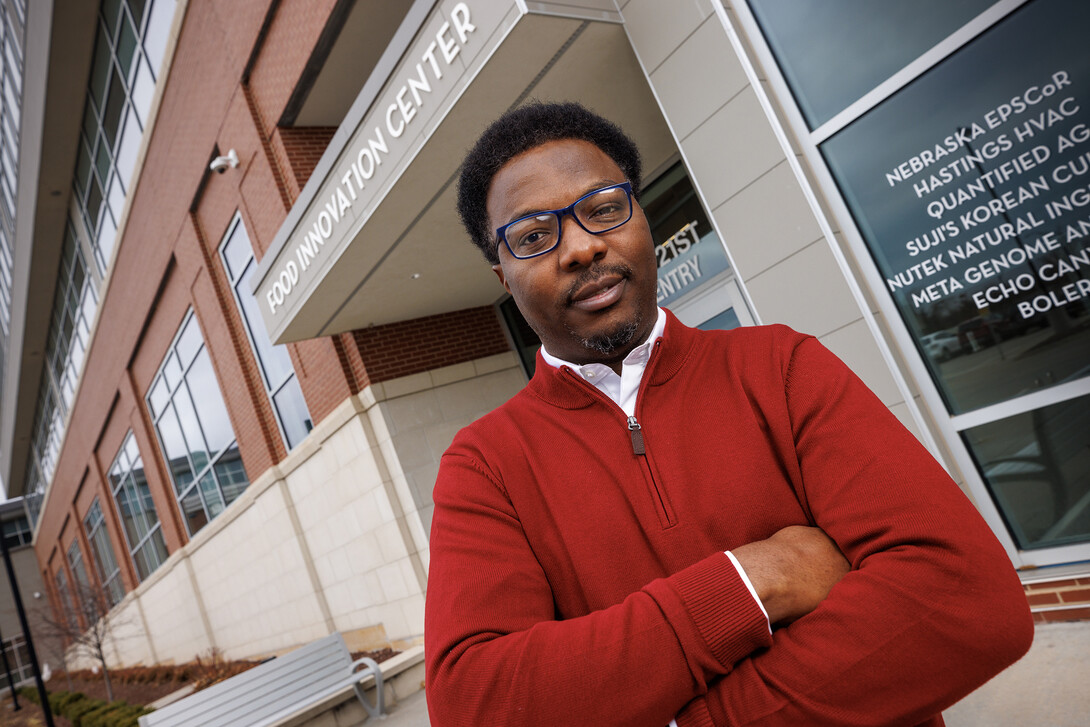
University of Nebraska–Lincoln food engineer Charles Nwaizu has spent his professional career researching food supply chains, and now he is taking that knowledge back to his home country through the Carnegie African Diaspora Fellowship Program.
Nwaizu was selected as a fellow in December and is currently working on his project, “Research Collaboration and Curriculum Co-Development in Food Engineering with the Infusion of Student-Centered Active-Based Learning,” in partnership with Taofiq Olanrewaju at Ahmadu Bello University in Nigeria. The Carnegie African Diaspora Fellowship Program is funded by the Carnegie Corporation of New York and administered by the Institute of International Education. The fellowship allows African institutions in Ghana, Kenya, Nigeria, South Africa, Tanzania and Uganda to host an African-born scholar to work on projects in research collaboration, graduate student teaching/mentoring and curriculum co-development.
Nwaizu’s project is using computational models to examine the tomato supply chain in Nigeria while incorporating student-centered data collection, research methods and classroom instruction. He is working remotely on the project, with plans to visit Nigeria in July.
“This aligns with my research, which, broadly, looks at food systems, from production to processing to transportation, even consumption,” Nwaizu, assistant professor of practice in food science and technology, said. “What are the impacts of these steps in the food chain on the quality and safety of the food, and how does that affect the wellness and health of consumers? I use computational models to find these impacts. We can use the models to predict things and understand these complex food systems.”
Nigeria, where Nwaizu grew up, is the most populous country in Africa and is on track to become the third most populous country in the world by 2050. It currently has a population of 220 million. Nigeria is a leading producer of many crops and food commodities, but Nwaizu said its food supply chains need improvement.
“According to data from the United Nations World Food Program, it was estimated that approximately 22% of the population in Nigeria suffered from acute malnutrition or are facing severe hunger,” he said. “That is about 48 million people, but a large percent of food produce in the country goes to waste, especially fresh fruits and vegetables.”
Tomatoes were chosen for the project because Nigeria is one of the largest producers of the crop in Africa but 45% of that production is wasted or lost before it can reach consumers, Nwaizu said.
“We want to use mathematics and computer models to understand and fix this loss in the chain,” he said. “With the Carnegie fellowship, we’re looking at where that loss is happening. Then, the government can channel its resources and policies to that point. The government has limited resources, so we can point them to where policy and action is needed.
“It’s one crop out of many, but with this we are laying some groundwork to see if and how we can mitigate this.”
The project is also laying the groundwork to incorporate more experiential learning in the classrooms.
“Instruction is much more passive in Nigeria, and we want to change this,” Nwaizu said. “The students are working on this project with us, collecting data, and we are adding visualization tools to the curriculum to aid experiential learning.
“We’re starting something new in the food engineering profession in Africa, whereby we’re changing curriculum at this university, but maybe other universities will learn about this and start changing their curriculum to become more student-centered, more experiential.”
As the project, which is in the data collection phase, proceeds, Nwaizu hopes the students working on it will be inspired to continue their education and careers to aid in fixing food supply issues in Nigeria and beyond.
“We hope we will better aid students’ understanding, but also, by having them work on the project with us, build their passion for professional food engineering in Africa and Nigeria,” he said.







